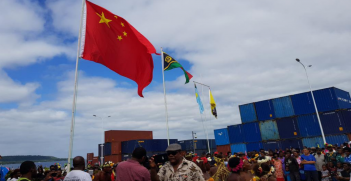Stormy Seas Surround the Port of Darwin

A litmus test is at hand of just how far domestic politics and vague national security “threats” now drive Australian government decision-making towards China. The test involves the Chinese company, Landbridge, and its lease to operate the Port of Darwin.
In April, former Prime Minister, Kevin Rudd, said he expected that domestic political vulnerabilities would drive the Morrison government to tear up the deal with Landbridge, struck in October 2015. What makes the Darwin Port deal instructive is that the case for leaving the lease alone is so strong.
For starters, the authoritative security assessments given to the government are on the public record. This means a whispering campaign or a claimed, well-placed anonymous source suggesting otherwise can’t muddy the waters.
In November 2015, Dennis Richardson, then-secretary of Defence stated: “We [Department of Defence] and ASIO [Australian Security Intelligence Organisation] have looked very carefully at it from the point of view of espionage and issues of a security nature. We are at one in agreeing that this was not an investment that should be opposed on defence or security grounds.” Quizzed in July 2018, Julie Bishop, then-foreign minister, emphasised that the original assessment was “still the case.” When asked about the “strategic threat” posed by the lease in September 2020, then-Defence Minister Linda Reynolds replied that, “we currently do not have any defence security issues.” On 28 April this year, Prime Minister Scott Morrison confirmed he still had not received any advice that the Department of Defence or security agencies had changed their view.
Several developments prompted Morrison being asked, including a report produced in February by a joint parliamentary committee chaired by George Christensen, an MP with a long track-record of China alarmism. This contained a recommendation the government establish whether the Darwin Port lease was subject to the Foreign Relations Act passed in December 2020, and in particular, its provision allowing the foreign minister to terminate agreements struck by state governments, local councils, and publicly-funded universities with foreign governments and related entities. The government’s decision on 21 April to use that provision to tear up the Victorian state government’s memorandum of understanding with China on the Belt and Road Initiative (BRI) also animated the same commentators who campaigned against the Darwin Port deal in 2015 to stir the pot once again.
Now, the Port of Newcastle – 50 percent owned by China Merchants Port Holdings Company – was in their firing line too. On 27 April the Australian Strategic Policy Institute’s Peter Jennings claimed this stake meant the Communist Party of China could increase port usage charges at its discretion and “hurt Australian businesses.” The only question was “when will it suit China to do so?” Jennings did not explain why the 50 percent Australian co-owner would have no say in this, nor how it was even possible when – to cite just one consideration – the port has already entered into 10-year price deeds with vessel operators.
Nonetheless, with the public mood in Australia towards China having collapsed over the past year, the political ground for a renewed campaign to be prosecuted was even more fertile. And less than a week later, the National Security Committee of Cabinet had tasked the Department of Defence with providing updated advice on Darwin Port. Veteran political commentator Paul Kelly wrote: “This review is driven by the political system. It is not driven by anything Landbridge has done. It is not driven by any new identified security threat at Darwin Port. It is not driven by any identifiable threat to defence operations…”
The only “new” element being bandied about by the likes of Peter Jennings was that “strategic change is reshaping our region, raising serious risks.” But precisely what these risks were, and how a Chinese company holding the lease to operate Darwin Port limits an Australian response, was once again not explained. Is it that a war with China is now to be regarded as a serious possibility, and with Darwin Port to serve as a vital asset in the conflict?
But the “port” operated by Landbridge is a collection of commercial “wharves.” A new facility outside of Darwin, such as one reported as being discussed in 2019, might be more useful.
Yet even then the argument falls apart. As a former senior official told journalist Max Suich in May, “If the Morrison government was genuine in its talk about war with China, it would be criminally negligent not to be spending 5-6 per cent of GDP on defence.”
And one day Xi Jinping will not be China’s president. The US might settle on being more accommodating of China’s strategic weight. In any case, as former secretary of the Department of Foreign Affairs and Trade (DFAT), Peter Varghese, said in June: “China is not an enemy, adversary or competitor of Australia.” Yet tearing up the Darwin Port lease could only be interpreted in Beijing as Canberra already having made up its mind about what Australia’s future relationship with China will look like.
The lack of a security imperative aside, the Morrison government will also have to twist itself inside out to find a basis in legislation to cancel the Landbridge lease. Both Foreign Minister Marise Payne and DFAT have said that as a commercial arrangement, the lease would not fall within the scope of the Foreign Relations Act. Similarly, while a new Foreign Investment Reform bill introduced in December last year gave the Treasurer a “last resort power” to force a divestment “in extraordinary circumstances,” the lease plainly does not meet this threshold. The Department of the Treasury also notes the new legislation is not retrospective. Peter Jennings has suggested seizing control using defence “step in” rights – previously thought to pertain to war-time situations. This would, however, raise sovereign risk by making a mockery of claims that investor rights in Australia are protected by a stable and secure legal environment.
Finally, “what next”? China can, and will, respond. When Canberra struck down Victoria’s BRI deal, Beijing suspended a non-legally binding deal too. In the case of the Darwin Port, however, the deal is legally binding. So what might Beijing look at in retaliation?
Pity Australian companies with significant investments in China. Not even the China-Australia Free Trade Agreement could be guaranteed as safe. The outcome of this litmus test will be illuminating.
Professor James Laurenceson is Director of the Australia-China Relations Institute (ACRI) at UTS. He has previously held academic appointments at the University of Queensland (Australia), Shandong University (China), and Shimonoseki City University (Japan). His research has been published in leading scholarly journals including China Economic Review and China Economic Journal. Professor Laurenceson also provides regular commentary on contemporary developments in China’s economy and the Australia-China economic relationship. His opinion pieces have appeared in Australian Financial Review, The Australian, Sydney Morning Herald, South China Morning Post, amongst many others.
This article is published under a Creative Commons License and may be republished with attribution.





